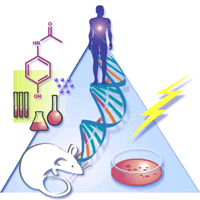 |
|
Regulatory Networks Involved in Environmental Stresses Richard S. Paules, Ph.D.
Principal Investigator and Director, Microarrays Core Facility Tel (919) 541-3710 Fax (919) 316-4771 paules@niehs.nih.gov P.O. Box 12233 Mail Drop D2-03 Research Triangle Park, North Carolina 27709 Delivery Instructions Research SummaryThe Environmental Stress and Cancer Group investigates the molecular mechanisms of responses to environmental stresses involved in the etiology and progression of injury and disease processes. 
The overall goal of the group’s studies is to provide a better understanding of the regulatory networks that control critical cellular responses to environmental stresses. It is currently investigating cell cycle checkpoint responses to cellular damage from various environmental stresses and how defects in these responses can contribute to cancer. Intricate regulatory networks control stress-induced cell cycle checkpoints and these networks respond in a damage- and cell type-specific manner. Group members are presently studying the critical molecular events that regulate cell cycle checkpoint signaling following exposures to ionizing radiation (IR), ultraviolet (UV) radiation, oxidative stress and other environmental stresses. In addition, they are investigating the cellular specificity of these processes in normal human cells (e.g. diploid fibroblasts, lymphoid cells, and normal breast epithelial cells) and cells with genetic alterations in cancer susceptibility genes, such as the gene mutated in ataxia telangiectasia (ATM). Moreover, mechanistic studies are underway to characterize the function of the ATM and the related ATR protein kinases in these processes. In addition, the group is designing, executing, and analyzing studies that integrate global "omics" approaches with conventional studies of environmental stress, toxicity and disease processes. Core to these toxicogenomic efforts is the concept of phenotypic anchoring, in which studies are designed to relate alterations in gene expression to adverse effects defined by conventional parameters of toxicity and pathology. Studies are designed to provide insight into mechanisms of injury and disease as well as to establish signatures of adverse effects to develop putative biomarkers. The Environmental Stress and Cancer Group has utilized microarray analyses for gene expression and microRNA expression profiling to examine genomic responses to environmental stresses. These studies have utilized agents at multiple doses and times of treatment to fully explore ranges of biological responses to those agents. Analyses that implicate a critical role of a particular biological process or of a particular gene in an adverse response are followed up with additional experiments designed to test hypotheses concerning these roles. Major areas of research:
Current projects:
Richard S. Paules, Ph.D., heads the Environmental Stress and Cancer Group and the NIEHS Microarray Group within the Laboratory of Molecular Toxicology. He received his Ph.D. from the Department of Pathology at the University of North Carolina at Chapel Hill in 1984. Paules completed postdoctoral training in the laboratory group of George F. Vande Woude at the National Cancer Institute-Frederick Cancer Research Facility before joining NIEHS in 1990. He has authored over 75 peer-reviewed articles in leading biomedical journals, as well as over 15 book chapters and invited publications. Paules currently serves as Associate Editor of Physiological Genomics and on the editorial board of Environmental Heath Perspectives. Since joining the NIEHS, Paules has been recognized with three NIH Merit Awards and an NIH Director's Award. |
|

